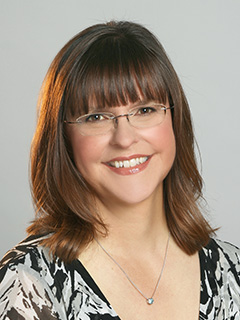1992 Graduate Student Scholarship, 2012 Clinical Research Grant
A Smart Investment
Carolyn Baylor has a history with the ASHFoundation.

In 1992, as a master’s student studying speech-language pathology at the University of Washington (UW), Baylor was awarded an ASHFoundation Graduate Student Scholarship. In 2012, now on the faculty of UW, she received an ASHFoundation Clinical Research Grant. In 2016, her work is successful and ongoing, which just proves the ASHFoundation made a very smart investment in 1992.
Baylor, a member of the Department of Rehabilitation Medicine at UW, has always been interested in both clinical care and clinical research. In the area of clinical care those interests are with adults who have a wide variety of neurologic and acquired communication disorders, including those with aphasia. She also has a clinical interest in individuals with voice disorders and head and neck cancer.
Baylor’s involvement in clinical research developed as a natural extension of her curiosity regarding issues she observed during her work in clinical care. Those early experiences led to her fruitful and now long-time collaboration with colleagues in UW’s Department of Rehabilitation Medicine on “developing procedures to measure clinical outcomes with a specific focus on self-report measures of the impact of communication disorders on life participation for adults across a range of different communication disorders.”
The group has developed a measure called the Communicative Participation Item Bank (CPIB) that they have been using successfully for both clinical and research purposes. The CPIB is, as Baylor describes it, “a patient-reported outcome measure that collects information from the patient’s perspective, especially in the area of communicative participation.” Baylor and her colleagues seek to measure outcomes that are related to an individual’s communication condition, that is, “how do the patient’s communication impairments, along with social and environmental factors, interfere with communication in different speaking conditions?”
The group described the work in an article in the Journal of Speech, Language, and Hearing Research (2013, JSLHR, 56, 1190-1208) that reports data on a short form of the measure in patients with multiple sclerosis, Parkinson’s disease, amyotrophic lateral sclerosis, and head and neck cancer. “We were able to reduce the number of items in the measure,” Baylor summarizes, “and still achieve good measurement precision with no significant differences across the four clinical groups.”
So, this brings us back to that history of Baylor’s with the ASHFoundation, which began in 1992. Here’s how that initial investment is still paying off: In 2012 Baylor was awarded an ASHFoundation Clinical Research Grant to conduct a study entitled “Validating the Communicative Participation Item Bank for the Aphasia Population,” a proposal that was an extension of the earlier research she and her colleagues had performed on CPIB, this particular work validating the CPIB specifically for people with aphasia. The continuing research was made possible because in 1992 Baylor was awarded a Graduate Student Scholarship by the ASHFoundation that sealed her interest in clinical care and clinical research.
It should also be said that, along the way, NIH also awarded Baylor funding—and is still awarding her funding—from the National Institute for Deafness and Other Communication Disorders. Which only proves further that the ASHFoundation knew what it was doing in 1992.
View More Recipient Spotlights